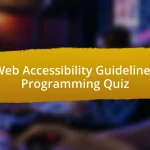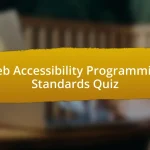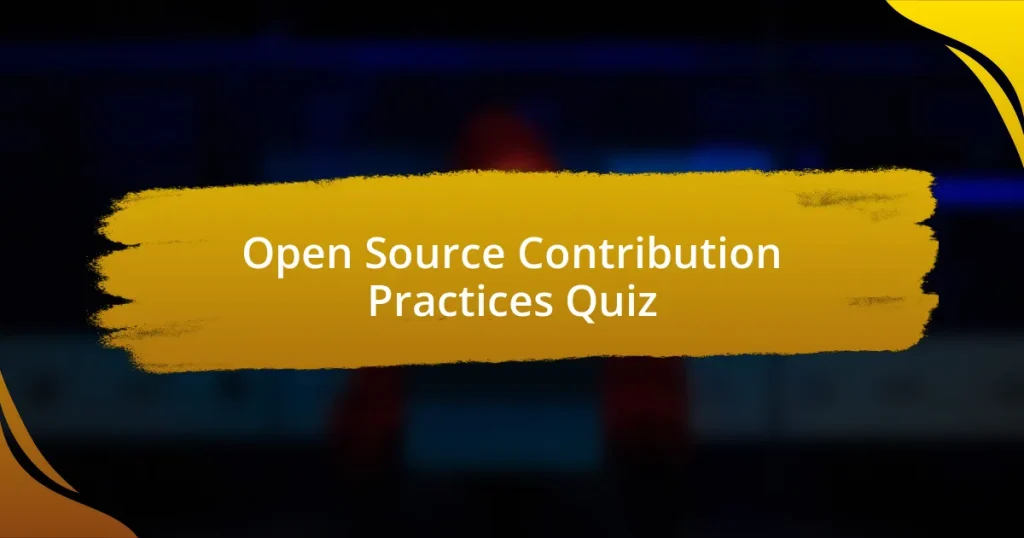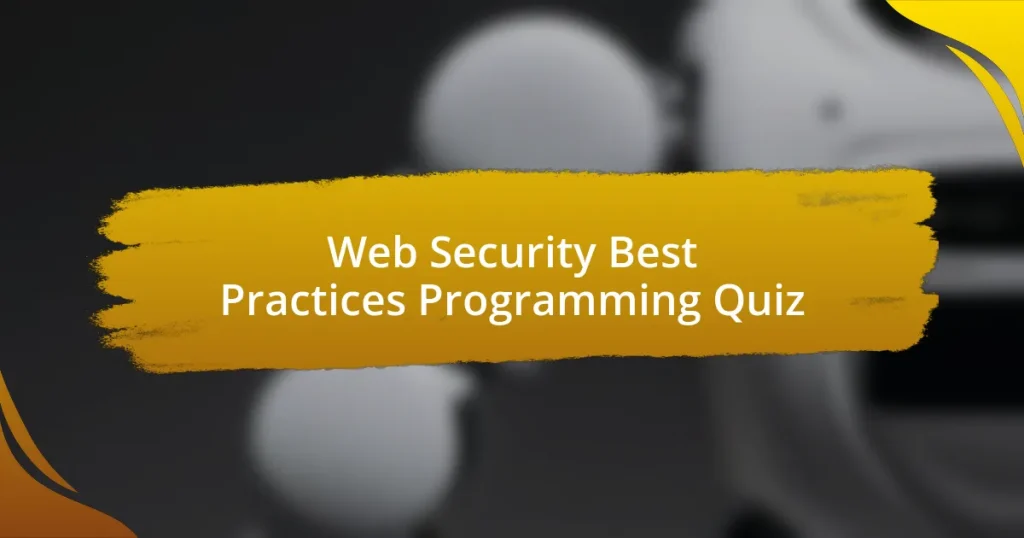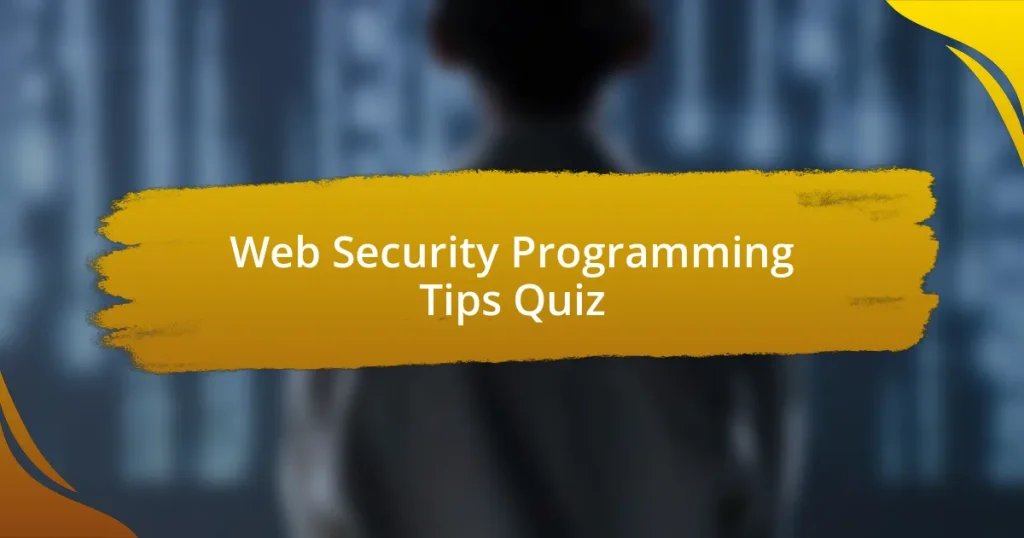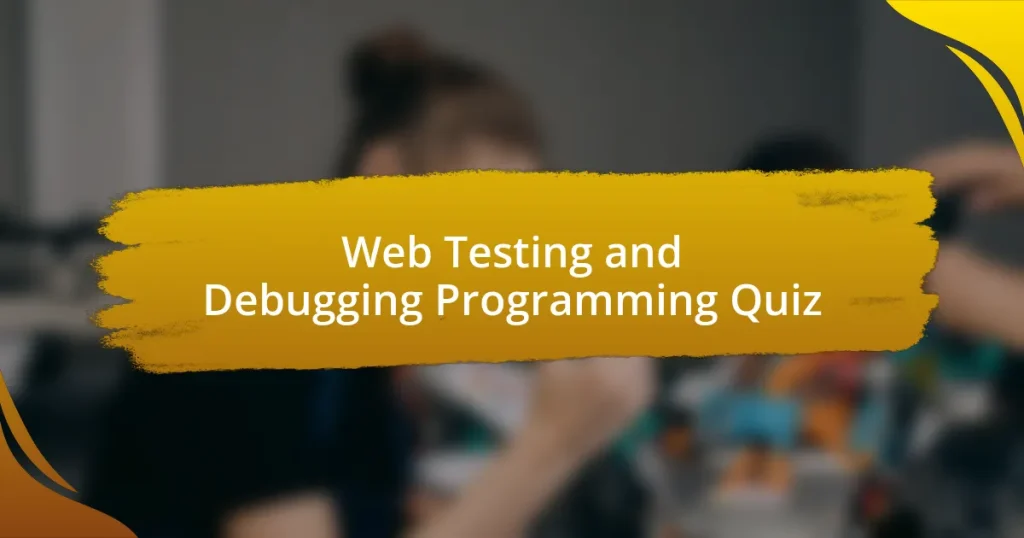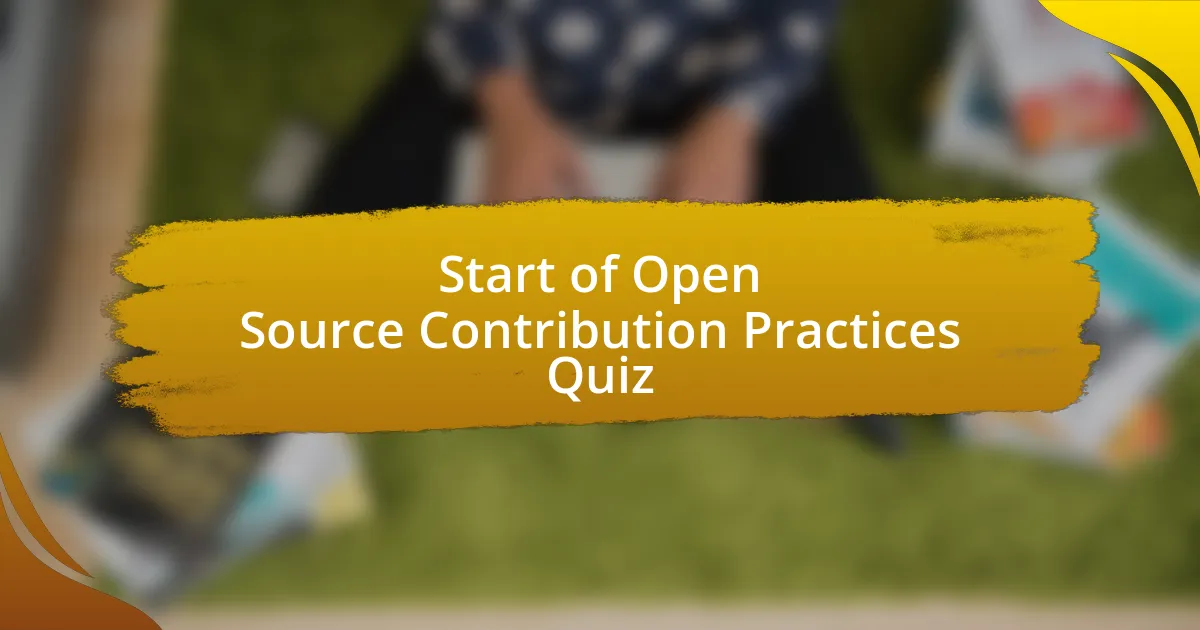
Start of Open Source Contribution Practices Quiz
1. What should you do before making any contributions to an open source project?
- Ignore the existing codebase.
- Read and follow the contributing guidelines.
- Make changes directly to the main branch.
- Submit a pull request immediately.
2. How can you identify a way to contribute to an open source project?
- Ask the maintainer for an assignment before doing anything.
- Look for open issues, feature requests, or areas of the code that could be improved.
- Review the project’s history to find popular contributors.
- Only contribute if you are an expert in the technology stack.
3. What should you set up according to the project’s guidelines?
- Team structure
- Project goals
- Your development environment
- User permissions
4. Where should you make your changes in an open source project?
- In a new branch.
- In the main directory.
- On the project’s website.
- In a separate file.
5. What should you ensure before submitting your changes?
- That they don’t break any existing functionality.
- That they align with your previous work.
- That they only improve aesthetics.
- That they meet personal preferences in style.
6. What should you do after submitting a pull request?
- Participate in the code review process by responding to comments and making any necessary changes.
- Delete the pull request immediately and start over.
- Merge it into the main branch without review.
- Ignore all comments and wait for it to be merged.
7. How should you implement changes in an open source project?
- Avoid testing your changes before submission.
- Make changes without notifying the maintainers.
- Implement partial changes incrementally.
- Implement changes directly in the main branch.
8. What should you include with your changes?
- A list of potential bugs.
- Relevant tests and documentation.
- Only comments and notes.
- Just a summary of your changes.
9. How should you follow project rules and guidelines?
- Ignore all established rules and guidelines.
- Follow only the most recent updates from contributors.
- Adhere to project guidelines and coding standards.
- Refer to personal coding preferences instead.
10. How should you accept feedback?
- Ignore feedback and continue.
- Accept feedback only if it`s positive.
- Accept feedback gracefully.
- Reject all feedback immediately.
11. What is the best strategy for submitting changes in an open source project?
- Submit all changes in one large pull request.
- Submit changes without any relevant documentation.
- Submit changes randomly without following project guidelines.
- Submit changes one at a time in a sequential manner.
12. How should you handle conflicts in the project community?
- Publicly criticize others involved to make your point.
- Ignore all feedback and continue as usual regardless of the situation.
- Let established community members moderate the conflict, and actually read what they are saying to address their points calmly.
- Escalate the issue to external parties immediately without discussion.
13. What should you do if a senior maintainer ignores your implementation and substitutes their own?
- Ignore the senior maintainer and proceed with your original implementation.
- Accept the result gratefully if the other implementation is successful, and contribute to improving the new implementation as needed.
- Leave the project entirely and stop contributing.
- Raise an immediate complaint about the senior maintainer`s actions.
14. How should you respond to irrelevant and offensive comments on a project mailing list?
- Engage in a lengthy discussion about the irrelevance of their comments.
- Ignore the comment and just answer the technical issues, or politely ask the poster to not make such comments and ask moderators to quiet the issue offline if needed.
- Reply aggressively to the comment to express your discontent.
- Report the commenter immediately without addressing the issue.
15. What should you read before contributing to an open source project?
- The issue tracker for current bugs and features.
- The official website and user testimonials.
- The project’s documentation, including the README file and contributing guidelines.
- The code of conduct and user contributions.
16. What is the purpose of a Code of Conduct in an open source project?
- To outline the behaviors expected from contributors.
- To set a deadline for contributions.
- To provide a list of approved contributors.
- To define the project`s coding standards.
17. How should you start contributing to an open source project if you’re new?
- Contribute without understanding the project goals.
- Only read the project’s documentation first.
- Jump straight into major feature development.
- Start with small contributions, such as fixing typos or minor bugs.
18. How can you avoid duplicate work in an open source project?
- Use the issue tracker to see if the work is already in progress or an acknowledged issue.
- Create a new repository for every change you want to make.
- Change the project name to avoid confusion with other work.
- Limit contributions to only your own area of expertise.
19. What should you follow in terms of style guide?
- General best practices from unrelated programming languages.
- Arbitrary rules made up by individual contributors.
- Specific guidelines on formatting code, coding style, writing commit messages, submitting pull requests, or documenting functions.
- Personal preferences on code layout and structure.
20. How should you communicate effectively in an open source project?
- Use vague language that might confuse readers.
- Explain your rationale and provide context when commenting on an issue.
- Write comments using technical jargon without context.
- Avoid communicating with other contributors entirely.
21. What should you include in your commit messages?
- Personal opinions unrelated to the code.
- Long and complicated descriptions of changes.
- Clear and concise messages that explain your changes and their purpose.
- Ambiguous phrases about your work.
22. How should you participate in discussions in an open source project?
- Discuss features, bugs, and improvements.
- Argue about unrelated topics.
- Ignore the community`s suggestions.
- Critique personal opinions harshly.
23. What is the first step in contributing to an open source project?
- Fix a bug in the code.
- Read and follow the contributing guidelines.
- Submit a pull request.
- Fork the repository.
24. How can you evaluate whether a project is suitable for new contributors?
- Analyze the project`s history and the number of stars on GitHub.
- Review the project`s financial backing and funding sources.
- Evaluate the project`s popularity among developers and users.
- Check if the project meets the definition of open source, actively accepts contributions, and is welcoming.
25. What should you do before opening an issue or pull request?
- Give context to help others quickly understand your issue or suggestion.
- Skip any preliminary explanations before submitting.
- Only use informal language to describe your issue.
- Immediately submit without any prior research.
26. How should you describe an error or issue in an open source project?
- Mention the open source license type of the project.
- List all known bugs and issues in the project.
- Describe only the code changes you made without context.
- Explain what you’re trying to do and how to reproduce the error.
27. How should you describe a new idea in an open source project?
- Describe it in technical jargon to impress others.
- Explain why you think it’d be useful to the project, not just to you.
- Focus solely on how it benefits you personally.
- Share your idea without any context.
28. What should you do if someone inserts an irrelevant political, religious, or philosophical comment into a technical discussion?
- Report the commenter to external authorities.
- Engage in an argument with the commenter.
- Ignore the comment and just answer the technical issues.
- Change the topic to a relevant technical discussion.
29. How can you ensure that your contributions are meaningful and impactful?
- Contribute only when requested by others.
- Focus solely on large features to make an impact.
- Follow project guidelines, adhere to coding standards, and participate in discussions.
- Avoid interacting with the community to prevent misunderstandings.
30. What should you do if your changes are not approved?
- Make any necessary changes based on feedback from project maintainers.
- Revert to the last version without any adjustments.
- Delete your changes entirely and start over.
- Ignore the feedback and submit again.
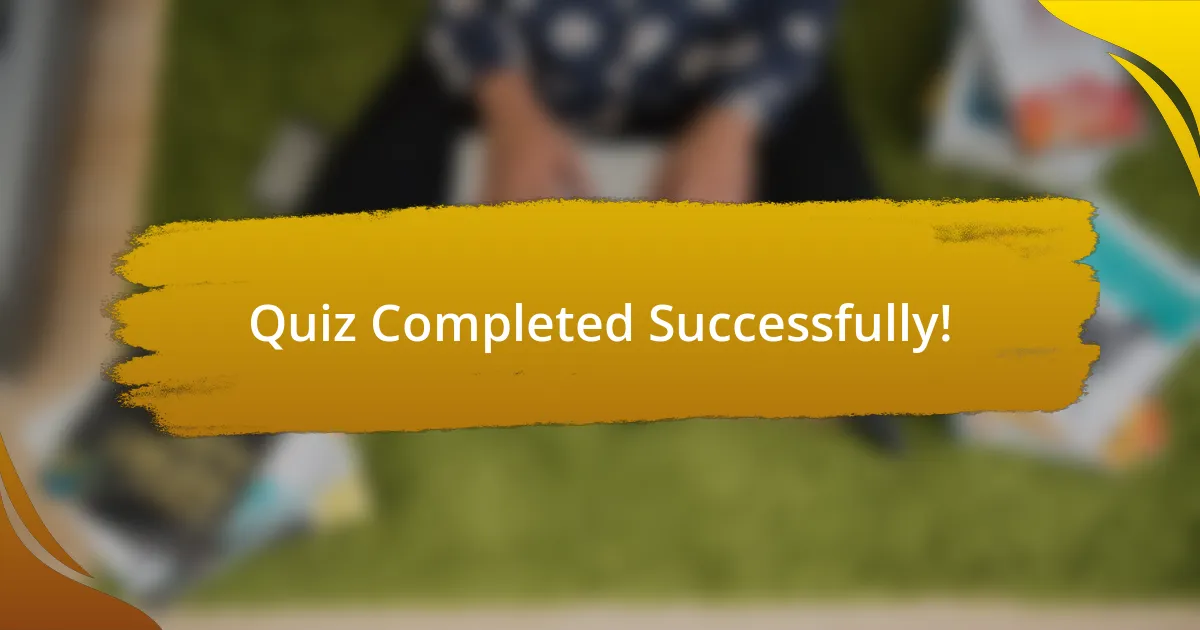
Quiz Completed Successfully!
Congratulations on completing the quiz about Open Source Contribution Practices! This was a great opportunity to test your understanding of how to effectively engage in open source projects. We hope you found the questions both challenging and enlightening, offering insights into the collaborative nature of open source work.
Throughout this quiz, you may have learned valuable lessons about the importance of clear communication, inclusive practices, and respecting community guidelines. These elements are crucial for successful contributions and fostering a supportive environment for all participants. Engaging in open source isn’t just about code; it’s about building relationships and being a part of something bigger.
To deepen your understanding further, we encourage you to explore the next section on this page dedicated to Open Source Contribution Practices. Here, you will find a wealth of information, resources, and best practices that can enhance your journey in the open source community. Dive in and continue your learning adventure!
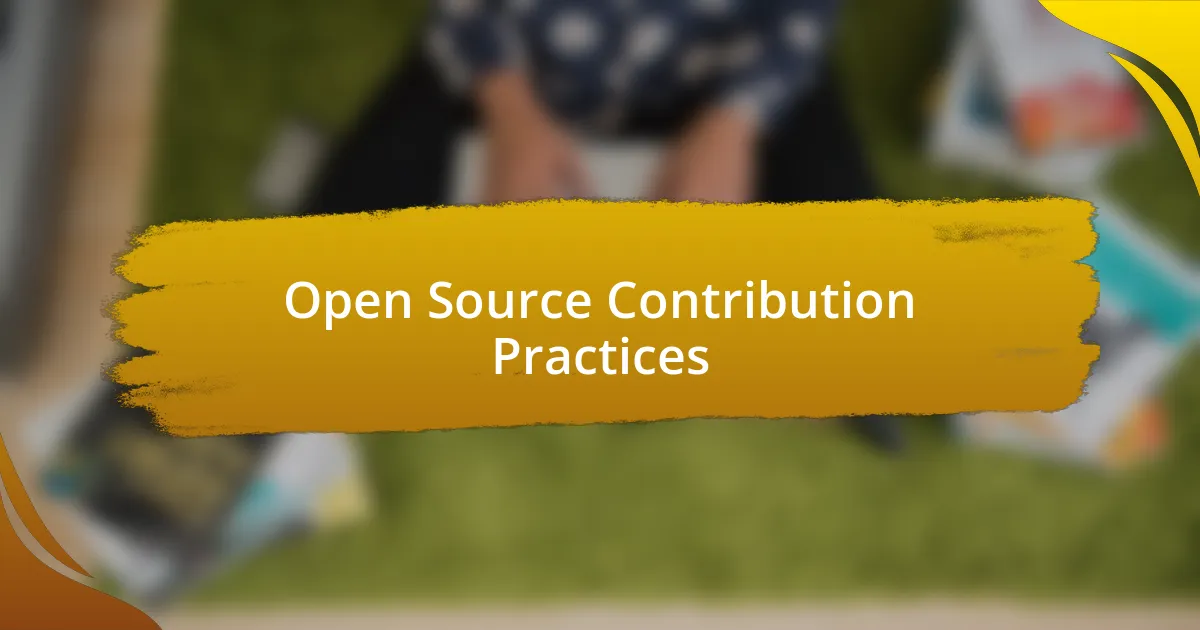
Open Source Contribution Practices
Understanding Open Source Contribution Practices
Open source contribution practices encompass the methods and behaviors that individuals use to engage with open source projects. These practices promote collaboration, transparency, and community engagement. Contributors include developers, designers, testers, and documenters working in software development. A key aspect is following the project’s guidelines, using version control systems like Git, and maintaining respectful communication with the community. These practices ensure that contributions are accepted and integrated effectively into projects, ultimately fostering a vibrant open source ecosystem.
The Role of Version Control in Open Source Contributions
Version control systems (VCS) are crucial in managing contributions to open source projects. They allow contributors to track changes, collaborate with others, and maintain the integrity of code. Git is the most widely used VCS in open source communities. Contributors typically fork a repository, make changes in a separate branch, and submit pull requests for review. This workflow encourages collaborative development and makes it easier to integrate diverse contributions while minimizing conflicts.
Best Practices for Making Effective Contributions
Adopting best practices is vital for making meaningful contributions to open source. Contributors should thoroughly understand the project’s documentation and code style guidelines before beginning. Writing clear commit messages, providing comprehensive pull request descriptions, and soliciting feedback from maintainers enhance communication. Testing contributions before submission ensures code quality. These practices increase the likelihood of acceptance and improve the overall contribution experience for both the contributor and the project maintainers.
Engaging with Open Source Communities
Active engagement with open source communities is essential for successful contributions. This includes participating in discussions on forums, mailing lists, or chat platforms like Discord or Slack. Helping others by answering questions or reviewing pull requests strengthens community ties. Many projects have established Code of Conducts to promote a welcoming environment. Understanding and adhering to these community norms fosters positive interactions, encourages collaboration, and enhances individual experiences within the community.
The Impact of Open Source Contribution on Professional Development
Contributing to open source projects can significantly impact personal and professional development. It provides opportunities to learn new technologies, improve coding skills, and gain experience working in diverse teams. Contributors often build a portfolio of work that showcases their skills to potential employers. Networking with other developers can lead to job opportunities and collaborations. Ultimately, open source contributions enhance both technical abilities and professional visibility in the tech industry.
What are Open Source Contribution Practices?
Open Source Contribution Practices refer to the methods and standards employed by individuals and organizations to effectively contribute to open source software projects. These practices include activities such as submitting code changes, reporting issues, and reviewing contributions. The goal is to enhance collaboration and maintain project quality. A study by GitHub revealed that 90% of new contributors make their first contribution within a week of joining an open source project, underscoring the importance of accessibility and streamlined practices for engagement.
How can one start contributing to open source?
To start contributing to open source, one should first identify projects that align with their interests and skills. They can browse platforms like GitHub to find repositories seeking contributors. Next, they should read the project’s documentation, particularly the contribution guidelines, and begin with small issues or documentation edits. According to the Open Source Initiative, engaging with the community through discussions is crucial for understanding project needs and establishing rapport. This approach minimizes the barriers to entry for new contributors.
Where can one find open source projects to contribute to?
Open source projects can be found on platforms such as GitHub, GitLab, and Bitbucket. These platforms host a vast range of repositories across various programming languages and domains. Additionally, websites like CodeTriage and Up For Grabs curate lists of projects that need help, making it easier for beginners to contribute. The annual Open Source Survey reports that over 80% of contributors find projects through social coding sites, highlighting these platforms as primary sources for discovering opportunities.
When is the best time to contribute to open source projects?
The best time to contribute to open source projects is generally when a project is actively maintained, and contributors are seeking help. This can be during a major update or release cycle or as part of organized events like Hacktoberfest, which occurs every October. Data indicates that contributions spike during these events, as they create a sense of community and urgency among developers. Engaging with an active community ensures timely feedback and more collaborative experiences.
Who can contribute to open source projects?
Anyone can contribute to open source projects, regardless of their experience level or background. Open source is inclusive, welcoming professional developers, hobbyists, and even those new to coding. According to a report by GitHub, over 60% of contributors are self-taught, reflecting the community’s openness to diverse skill sets. This accessibility promotes a collaborative culture where knowledge sharing is encouraged and valued among all contributors.







